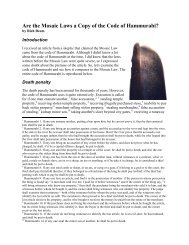Coming to Grips with the Early Church Fathers - Evidence for God ...
Coming to Grips with the Early Church Fathers - Evidence for God ...
Coming to Grips with the Early Church Fathers - Evidence for God ...
Create successful ePaper yourself
Turn your PDF publications into a flip-book with our unique Google optimized e-Paper software.
<strong>Coming</strong> <strong>to</strong> <strong>Grips</strong> <strong>with</strong> <strong>the</strong> <strong>Early</strong> <strong>Church</strong> Fa<strong>the</strong>rs’ Perspective on Genesis John Millam<br />
Un<strong>for</strong>tunately, few old earth creationists have written about <strong>the</strong> church fa<strong>the</strong>rs and what little<br />
<strong>the</strong>y have written is often poor quality (<strong>with</strong> Stanley Jaki as a notable exception). 6 This scarcity<br />
of solid resources is part of what motivated me <strong>to</strong> research this issue <strong>for</strong> myself.<br />
Based on my own research, no early church fa<strong>the</strong>r taught any <strong>for</strong>m of a day-age view or an earth<br />
older than 10,000 years. In fact, <strong>the</strong> first people that I can clearly identify as teaching <strong>the</strong> oldearth<br />
view are Isaac New<strong>to</strong>n and Thomas Burnet in <strong>the</strong> late seventeenth century. This seems like<br />
a fatal blow <strong>to</strong> old-earth creationism and a strong vindication of Mook’s position but closer<br />
examination shows o<strong>the</strong>rwise.<br />
Problems <strong>with</strong> Young-Earth Use of <strong>Early</strong> <strong>Church</strong> Fa<strong>the</strong>rs<br />
While Mook has many valid criticisms of old-earth creationists’ use of <strong>the</strong> church fa<strong>the</strong>rs, what<br />
of his own claims? Do <strong>the</strong> fa<strong>the</strong>rs really support his young-earth view? Does he accurately<br />
represent <strong>the</strong>ir positions?<br />
Mook does an admirable job of documenting specific claims made by individual fa<strong>the</strong>rs (and<br />
thus avoiding <strong>the</strong> trap that many old-earth creationists often fall in<strong>to</strong>), but he fails <strong>to</strong> look deeper<br />
at <strong>the</strong> underlying fac<strong>to</strong>rs that helped mold <strong>the</strong>ir interpretations. Instead, he presents an extremely<br />
one-sided analysis of <strong>the</strong> biblical and non-biblical fac<strong>to</strong>rs shaping <strong>the</strong> fa<strong>the</strong>rs’ interpretations in<br />
order <strong>to</strong> support his own desired conclusion. Sadly, I have found this <strong>to</strong> be a very common flaw<br />
in <strong>the</strong> young-earth usage of <strong>the</strong> patristics (<strong>with</strong> Bradshaw as a noteworthy exception).<br />
Consequently, most attempts <strong>to</strong> use <strong>the</strong> church fa<strong>the</strong>rs by both old-earth and young-earth<br />
creationists are seriously flawed, just in different ways.<br />
The simplest and most important example of Mook’s poor analysis is that he fails <strong>to</strong> grapple <strong>with</strong><br />
<strong>the</strong> patristic fa<strong>the</strong>rs’ linguistic dependence. These men were almost entirely dependent upon<br />
Greek and Latin translations of <strong>the</strong> Old Testament ra<strong>the</strong>r than <strong>the</strong> actual Hebrew in which<br />
Genesis was written. As Bradshaw documents in detail, none of <strong>the</strong> church fa<strong>the</strong>rs were fluent in<br />
Hebrew until Jerome and Theodore of Mopsuestia in <strong>the</strong> late fourth century. 7 (Prior <strong>to</strong> that, only<br />
Origen and possibly Eusebius in <strong>the</strong> third century seem <strong>to</strong> have actually studied Hebrew, but<br />
nei<strong>the</strong>r was fluent.)<br />
A deficient knowledge of Hebrew is probably <strong>the</strong> single most important fac<strong>to</strong>r leading <strong>to</strong> a<br />
young-earth misunderstanding of Genesis (see here <strong>for</strong> previous articles on this issue). This<br />
problem has continued <strong>to</strong> play a significant role even in our own time.<br />
Mook acknowledges that <strong>the</strong> church fa<strong>the</strong>rs were largely ignorant of Hebrew, but he relegates<br />
this critical observation <strong>to</strong> a mere footnote. 8 He does not discuss <strong>the</strong> implications this ignorance<br />
poses <strong>for</strong> <strong>the</strong>ir interpretations. Greek and Latin are very similar <strong>to</strong> each o<strong>the</strong>r but very different<br />
from ancient Hebrew. So even a “literal” interpretation based on ei<strong>the</strong>r of <strong>the</strong>se languages will<br />
not necessarily represent a literal understanding of <strong>the</strong> original Hebrew.<br />
6. Stanley L. Jaki, Genesis 1 through <strong>the</strong> Ages, (London: Thomas More Press, 1992). He covers more than 15.<br />
Jewish and Christian writers throughout church his<strong>to</strong>ry, which is <strong>the</strong> broadest review of any of my sources.<br />
Un<strong>for</strong>tunately, this great breadth means that he does not have <strong>the</strong> room <strong>to</strong> provide <strong>the</strong> level of detail I need <strong>for</strong><br />
my study.<br />
7. Bradshaw, Creationism and <strong>the</strong> <strong>Early</strong> <strong>Church</strong>, chapter 1, table 1.1.<br />
8. James Mook, “The <strong>Church</strong> Fa<strong>the</strong>rs on Genesis, <strong>the</strong> Flood, and <strong>the</strong> Age of <strong>the</strong> Earth,” 37-45.<br />
Page 3 <strong>Evidence</strong> <strong>for</strong> <strong>God</strong> from Science






